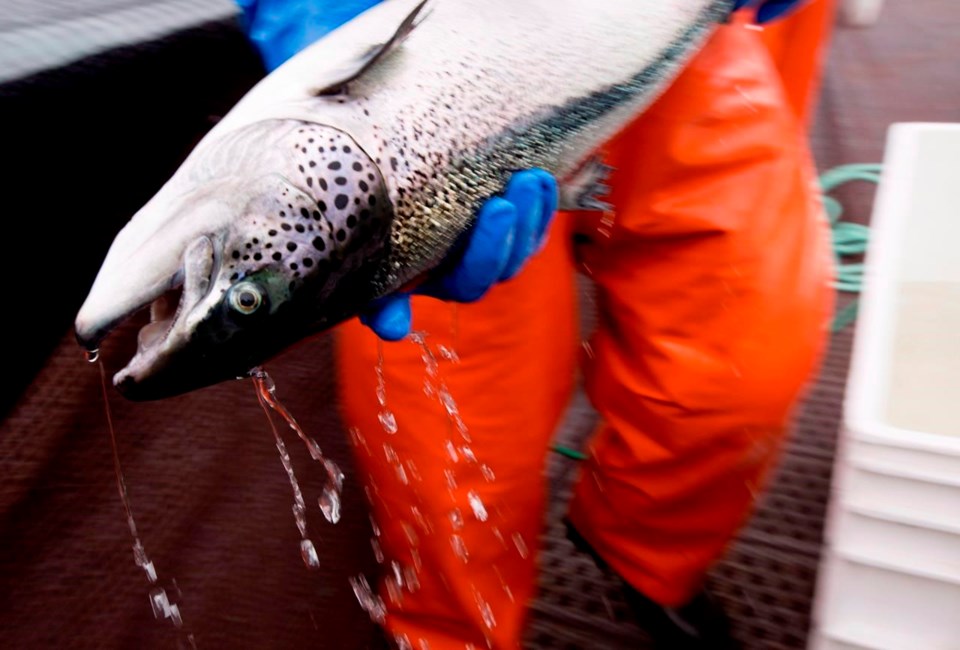VICTORIA — The backing of a land-based salmon farm in Japan by a global company with ties to ocean fish farms in British Columbia has Indigenous and conservation groups calling on the federal government to accelerate its transition away from open-net farms.
The international tide in aquaculture is shifting toward land-based salmon farms, and the sooner sa╣·╝╩┤½├Į gets on board the better for the protection of threatened wild salmon and the future of aquaculture in sa╣·╝╩┤½├Į, say representatives of the 120-member sa╣·╝╩┤½├Į First Nation Wild Salmon Alliance and non-profit group Wild Salmon Forever/Wild First.
"sa╣·╝╩┤½├Į really has to decide at this point if it wants wild Pacific salmon or if it wants this dirty, harmful industry. It can't have both," Tony Allard, founder of Wild Salmon Forever/Wild First, said in an interview. "That's how I see it. It's hard to talk your way out of it."
Open-net fish farms off sa╣·╝╩┤½├Į's coast are a flashpoint, with environmental groups and some Indigenous nations saying the farms transfer disease to wild salmon, while the industry and some local politicians say thousands of jobs are threatened if operations are phased out.
Earlier this month, federal Fisheries Minister Joyce Murray announced plans to extend a consultation period for a transition plan to shift away from open-net salmon farms in sa╣·╝╩┤½├Į by 2025.
Murray announced last February the government would not renew licences for 15 open-net Atlantic salmon farms around sa╣·╝╩┤½├Į's Discovery Islands.
This month, she said consultations for 79 other open-net farms will now continue through the summer, with a transition plan decision coming at an unannounced date.
"They must also realize that this is where the industry's going," Bob Chamberlin, First Nation Wild Salmon Alliance spokesman, said in an interview. "No one logs like they used to. No one mines like they used to. Everything evolves and it's time for this industry to do the same."
He said when he visited Norway more than a decade ago, salmon farm industry officials there said they operate open-net fish farms in sa╣·╝╩┤½├Į because they are permitted by the government.
"That was the last time I went to Norway to speak to them," he said. "I realized that the fight was at home."
Chamberlin said he's now more convinced than ever about having salmon farms removed from sa╣·╝╩┤½├Į waters after learning about the land-based project near Tokyo being built with financial backing from the Norwegian company, Grieg Group, which has investment ties to Grieg Seafood of Campbell River.
Grieg Seafood operates a fish hatchery, 22 ocean salmon farms and employs about 200 people in sa╣·╝╩┤½├Į
Amy Jonsson, Grieg Seafood communications director, said in a statement that Grieg Seafood of Campbell River did not invest in the Norwegian-based Proximar Seafood land-based salmon farm project in Japan.
She said Grieg Group of Norway is Greig Seafood’s main investor and a Proximar Seafood shareholder.
A Proximar Seafood spokesman could not be reached for comment about the estimated $88 million land-based salmon farm project, but the company's website said the farm is located about an hour's drive from Tokyo near Mount Fuji and will produce up to 5,300 tonnes of farmed Atlantic salmon annually.
Jonsson said transitioning the industry from open-net farms to land-based remains challenging on several fronts, technically and financially.
"To farm the entire production cycle on land has not yet been proven viable at a commercial scale," she said in the statement. "Developing the technology and competence is the first challenge that needs to be solved."
Jonsson also said once land-based technology does become viable, facilities will likely be located closer to their markets, which could result in job losses in rural communities.
The sa╣·╝╩┤½├Į Salmon Farmer's Association, which represents about 95 per cent of the province's fish farm producers, said an economic analysis commissioned by the provincial government concluded shifting to land-based salmon farming could cost up to $2.2 billion, and production and profit of the product was elusive.
"To move the entire sector on land isn’t a realistic option, nor is it required to protect wild salmon," said association president Brian Kingzett in a statement last February. "The federal government’s numerous science assessments have confirmed Atlantic salmon farms pose no more than a minimal risk to wild salmon abundance and diversity under the current fish health management practices."
Kingzett was not available for further comment.
Allard, who operates a private investment company in West Vancouver, said he supports salmon farming, but not open-net ocean farms.
"I'm a capitalist," he said. "I can see there's a need there and a business there, but you can't base your business on polluting for free and harming an iconic keystone species. The longer we dither on embracing what's now proven technology and play to our advantages, the more we're likely to squander our first-mover advantage on the Pacific coast."
A statement from Murray's office at Fisheries and Oceans sa╣·╝╩┤½├Į, said "sa╣·╝╩┤½├Į can be a global leader in sustainable aquaculture, while also making sure we protect keystone species like wild Pacific salmon."
This report by The Canadian Press was first published June 15, 2023.
Dirk Meissner, The Canadian Press




